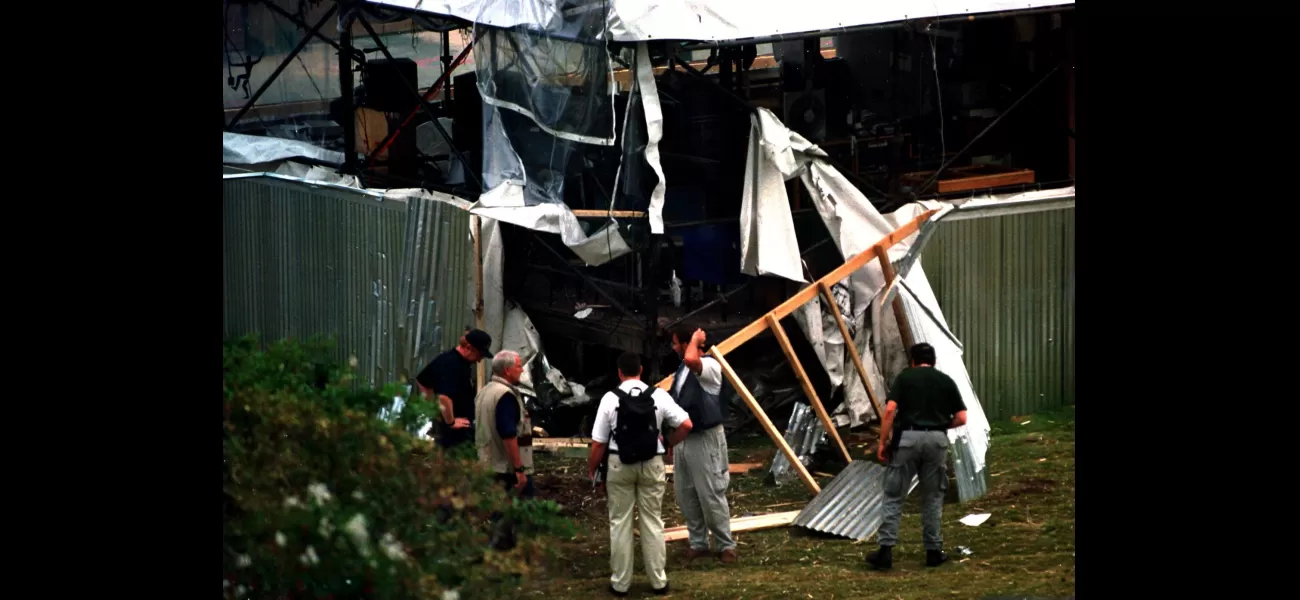Security guard falsely accused of bomb plot at 1996 Olympics.
A bomb is in Centennial Park and there is only 30 minutes to respond.
July 27th 2024.

It was a warm summer evening in Atlanta, Georgia, and the city was buzzing with excitement as the 1996 Summer Olympics entered its eighth day. Centennial Olympic Park was filled with crowds of people, enjoying the festivities and cheering on their favorite athletes. Among them was Richard Jewell, a 33-year-old security guard who had been on duty for over seven hours.
As he made his rounds, Jewell noticed something out of the ordinary - a military-style bag left unattended in the park. Despite the chaos and noise of the event, no one seemed to be paying attention to it. Jewell's instincts kicked in, and he immediately alerted the authorities. Minutes later, a call was made to 911 from a nearby phone booth, claiming that there was a bomb in Centennial Park and it would detonate in 30 minutes.
Jewell sprang into action, quickly moving people away from the area and out of harm's way. However, at 1:20 am, the bomb exploded, killing one woman and injuring over 100 others. It was a devastating and unexpected tragedy, but thanks to Jewell's quick thinking and bravery, many more lives were saved that day.
Despite being hailed as a hero in the aftermath of the bombing, the narrative surrounding Jewell slowly began to shift. Within days, this quiet and unassuming man who lived with his mother became a suspect in the investigation. But who was Richard Jewell?
Born in Danville, Virginia, Jewell moved to Atlanta with his family at a young age. He held various jobs before joining the Habersham County Sheriff's Office as a jailer in 1990. However, he was later charged with impersonating a police officer and resigned from his position. After a brief stint as a campus police officer, he returned to Atlanta and became a security guard for the 1996 Olympics.
It was during his time as a security guard that Jewell's life changed forever. By spotting the suspicious backpack, he unknowingly prevented a much larger tragedy from occurring. But the media, hungry for a sensational story, latched onto the idea that a security guard could be responsible for the bombing. This was fueled by a headline from The Atlanta Journal, claiming that the FBI suspected Jewell of planting the bomb.
The article, which did not cite any sources, sparked a media frenzy. Jewell's home was bombarded by reporters and cameras, and he was suddenly thrust into the spotlight as the prime suspect. The idea that a man who had risked his life to save others could also be the one who caused such destruction was a tantalizing story for the news outlets.
However, it was later revealed that Jewell was not the one behind the bombing. The real culprit was Eric Robert Rudolph, a lone wolf who had a history of violence and anti-government beliefs. He was eventually caught and is currently serving multiple life sentences.
For Jewell, the damage had already been done. Despite being cleared of any involvement in the bombing, his reputation and life were forever changed. He won multiple lawsuits against media outlets who had falsely accused him and continued to work in law enforcement. But the experience took a toll on him, and he became more cynical and distrusting of others.
Eventually, he married his wife Dana and lived a quiet life until his death in 2007. Though he will always be remembered as one of the heroes of the 1996 Olympic Bombing, the shadow of suspicion and false accusations will forever be a part of his story.
Sadly, the Atlanta bombing was not the only terror attack to occur during the Olympic Games. In 1972, the Munich Massacre shocked the world as 11 Israeli athletes and coaches were killed by terrorists. The attack remains the deadliest in Olympic history, and a moment of silence is often observed at subsequent Games in memory of the victims.
Despite these tragedies, the Olympic Games continue to bring people together in the spirit of competition and camaraderie. And while the memory of the 1996 bombing may still haunt those who were there, it serves as a reminder of the bravery and selflessness displayed by people like Richard Jewell in the face of danger.
As he made his rounds, Jewell noticed something out of the ordinary - a military-style bag left unattended in the park. Despite the chaos and noise of the event, no one seemed to be paying attention to it. Jewell's instincts kicked in, and he immediately alerted the authorities. Minutes later, a call was made to 911 from a nearby phone booth, claiming that there was a bomb in Centennial Park and it would detonate in 30 minutes.
Jewell sprang into action, quickly moving people away from the area and out of harm's way. However, at 1:20 am, the bomb exploded, killing one woman and injuring over 100 others. It was a devastating and unexpected tragedy, but thanks to Jewell's quick thinking and bravery, many more lives were saved that day.
Despite being hailed as a hero in the aftermath of the bombing, the narrative surrounding Jewell slowly began to shift. Within days, this quiet and unassuming man who lived with his mother became a suspect in the investigation. But who was Richard Jewell?
Born in Danville, Virginia, Jewell moved to Atlanta with his family at a young age. He held various jobs before joining the Habersham County Sheriff's Office as a jailer in 1990. However, he was later charged with impersonating a police officer and resigned from his position. After a brief stint as a campus police officer, he returned to Atlanta and became a security guard for the 1996 Olympics.
It was during his time as a security guard that Jewell's life changed forever. By spotting the suspicious backpack, he unknowingly prevented a much larger tragedy from occurring. But the media, hungry for a sensational story, latched onto the idea that a security guard could be responsible for the bombing. This was fueled by a headline from The Atlanta Journal, claiming that the FBI suspected Jewell of planting the bomb.
The article, which did not cite any sources, sparked a media frenzy. Jewell's home was bombarded by reporters and cameras, and he was suddenly thrust into the spotlight as the prime suspect. The idea that a man who had risked his life to save others could also be the one who caused such destruction was a tantalizing story for the news outlets.
However, it was later revealed that Jewell was not the one behind the bombing. The real culprit was Eric Robert Rudolph, a lone wolf who had a history of violence and anti-government beliefs. He was eventually caught and is currently serving multiple life sentences.
For Jewell, the damage had already been done. Despite being cleared of any involvement in the bombing, his reputation and life were forever changed. He won multiple lawsuits against media outlets who had falsely accused him and continued to work in law enforcement. But the experience took a toll on him, and he became more cynical and distrusting of others.
Eventually, he married his wife Dana and lived a quiet life until his death in 2007. Though he will always be remembered as one of the heroes of the 1996 Olympic Bombing, the shadow of suspicion and false accusations will forever be a part of his story.
Sadly, the Atlanta bombing was not the only terror attack to occur during the Olympic Games. In 1972, the Munich Massacre shocked the world as 11 Israeli athletes and coaches were killed by terrorists. The attack remains the deadliest in Olympic history, and a moment of silence is often observed at subsequent Games in memory of the victims.
Despite these tragedies, the Olympic Games continue to bring people together in the spirit of competition and camaraderie. And while the memory of the 1996 bombing may still haunt those who were there, it serves as a reminder of the bravery and selflessness displayed by people like Richard Jewell in the face of danger.
[This article has been trending online recently and has been generated with AI. Your feed is customized.]
[Generative AI is experimental.]
0
0
Submit Comment





